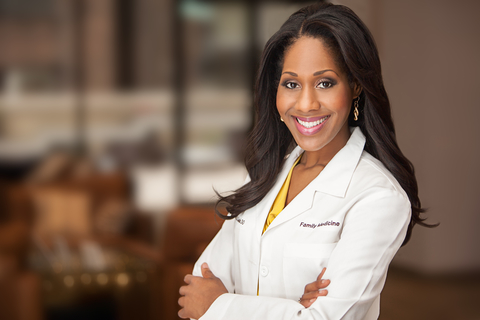So your patients want to be friends on social media.
Should you let them? It's just one of the challenges physicians can face when it comes to the world of social media.
A new survey by the American Osteopathic Association (AOA) found that more than half of millennials (54%) and more than four out of 10 adults (42%) are or would like to be friends with their healthcare providers on social media. And 65% of millennials and 43% of all adults say it is appropriate to contact a physician about a health concern through social media.
Jennifer Caudle, D.O., an osteopathic family physician in New Jersey who has a large online following, said she is not surprised by those results.
“People are more engaged with social media so it sort of seems like a natural progression but sometimes it can get a little tricky,” Caudle said in an interview with FierceHealthcare.

(American Osteopathic Association)
Social media can cut two ways: It can be an effective tool for physicians to share medical information, but it can also get doctors who aren’t savvy about social media protocol into trouble navigating in a public space.
RELATED: More surgeons rely on social media to learn about new techniques, practices
Here are a few best practices doctors can follow when using social media.
Protect yourself and your patients
While patients feel one way about social media, doctors are trying to figure out how to manage the patient relationship on Facebook, Twitter, Instagram and other social media platforms that are traditionally designed for sharing content that is not private or sensitive, says the AOA.
Case in point: "Please don't send me a picture of your rash on Facebook Messenger," said Caudle, who is also an associate professor at the Rowan University School of Osteopathic Medicine. "I want to be an active part of my patients’ care, but social media does open up opportunities for over-sharing or providing information that would be best managed in the office setting or through designated telemedical technology.”
Social media isn’t a good platform for addressing patients’ personal medical questions—for instance, a patient that sends a message asking what to do about the headaches they are having, she said. First, communicating via social media might not be secure, and second, Caudle said she wants that patient to come into the office to investigate their complaint.
Whatever they post on social media, doctors need to be aware of HIPAA concerns and protect the confidentiality of patients, she said.
It is an individual decision whether a physician wants to "friend" a patient, Caudle said, but she also advised caution. Caudle does what many experts advise—she maintains a professional identity online and a private identity among friends and family. When a patient requests to friend her on one of her personal accounts, she steers them to one of her professional accounts.
“That made a lot of sense to me,” she said.
A way to communicate information
Social media can be very powerful and is a way to convey information to patients, Caudle said.
The AOA’s online survey of over 2,000 adults found that nearly one-third of Americans (32%) have taken an action related to their health—such as changing diet, exercise or medication—as a result of information they read on social media.
"People—and young people in particular—don't go to the doctor as often as they should but they are interested in improving their health and wellness," Mikhail Varshavski, D.O., an osteopathic family physician in New York City who is the most "followed" doctor on social media, said in an AOA announcement about the survey. "If I can inspire a positive lifestyle change in someone through YouTube, then I've been an effective physician."
RELATED: 5 influential ER docs on Twitter—A scientific approach
Known as "Doctor Mike," Varshavski reaches millions weekly through his YouTube channel, as well as a Twitter, Instagram and Facebook accounts. Social media can provide information about topics as wide-ranging as addiction, nutrition and mental health, he said.
Patients need to be sure they are seeking out credible sources of health information from social media, said Caudle. In a recent post on KevinMD, obstetrician/gynecologist Valerie A. Jones, M.D., said there is a desperate need for physicians to engage on social media to counter the pseudoscience or misinformation about medical topics, such as the HPV vaccine.
“If physicians aren’t writing about these topics, someone else will,” she warned.